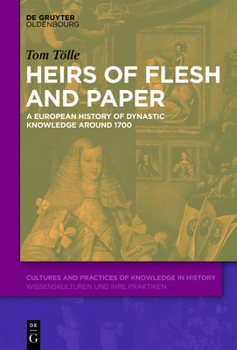Heirs of Flesh and Paper: A European History of Dynastic Knowledge Around 1700
"Heirs of Flesh and Paper" tells the story of early modern dynastic politics through subjects' practical responses to royal illness, failing princely reproduction, and heirs' premature deaths. It treats connected dynastic crises between 1699 and 1716 as illustrative for early modern European political regimes in which the rulers' corporeality defined politics. This political order grappled with the endemic uncertainties induced by dynastic bodies. By following the day-to-day practices of knowledge making in response to the unpredictability of royal health, the book shows how the ruling family's mortal coils regularly threatened to destabilize the institutionalized legal fiction of kingship. Dynastic politics was not only as a transitory stage of state formation, part of elite cooperation, or a cultural construct. It needs to be approached through everyday practices that put ailing dynastic bodies front and center. In a period of intensifying political planning, it constituted one of the most important sites for changing the political itself.
Related Subjects
History




